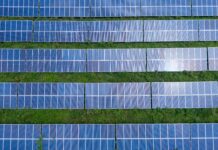Doug Young
Just months after tapping financial markets for nearly $250 million, solar panel maker Trina (NYSE: TSL) has just announced another plan to raise a similar amount as it tries to take advantage of improving sentiment towards its sector. Such fund-raising would have been unthinkable as recently as a year ago, when recovery of the solar panel sector was far from certain following a prolonged downturn. In a relatively positive sign, Trina’s latest fund-raising plan didn’t trigger a major sell-off in its shares, indicating investors are more confident of the company’s and the sector’s future prospects.
Meantime in other major solar news, the sector got a nice boost with word that Hong Kong-listed real estate Evergrande (HKEx: 3333) plans to get into the business of solar plant development with a major new investment. That move isn’t hugely surprising, since China’s real estate sector is now on the cusp of a major correction that is likely to crimp demand for the kinds of residential properties that Evergrande develops. In the absence of major new residential development projects, solar power stations looks like an interesting alternative to diversify the company’s business.
Both of these developments are generally positive for the solar sector, reflecting growing momentum for a new wave of solar plant building in China as Beijing offers strong incentives to encourage such construction. I’ve previously been a bit negative on developments so far, which have seen Trina and other solar panel makers personally finance much of the new plant development. But Evergrande’s decision to enter the space could mark the start of a new trend that may see more third-party developers join the movement from the real estate and other sectors where growth is stalling.
All that said, let’s begin with a look at Trina’s latest plan that will see it raise about $200 million through an offering of bonds and new American Depositary Shares (ADSs). The company will raise the money by selling $100 million in senior convertible notes (company announcement), and another 7 million ADSs that could raise more than $90 million based on the company’s latest share price. (company announcement)
The sale would follow a similar exercise that saw Trina raise about $250 million through the issue of convertible notes and ADSs back in June (previous post), bringing its total fund raising over the last 4 months to nearly half a billion dollars. The company joins rivals Canadian Solar (Nasdaq: CSIQ) and Yingli (NYSE: YGE), which have also recently returned to global capital markets after a freeze-out of more than 2 years during a prolonged sector downturn that sent major players Suntech and LDK into bankruptcy.
The most positive thing about Trina’s latest announcement is that it didn’t spark a major sell-off of the company’s shares, which fell just 2.7 percent after the news. That’s a sharp contrast from the June fund-raising announcement, which sparked a much larger drop of nearly 10 percent. Trina’s shares have gained back most of those losses since then, indicating investors are regaining confidence in the sector’s longer term growth prospects.
Meantime, Evergrande is reportedly getting set to enter the solar power development space through plans to invest a whopping 90 billion yuan ($14 billion) in 3 major solar plants over the next 3 years. (Chinese article) The investment figure looks a bit too large to me, though Evergrande does have a history of making exaggerated announcements and it’s also possible the media report isn’t completely accurate.
Regardless of the actual investment, the broader trend does look somewhat encouraging, as it indicates that some major third-party private sector players may be taking an interest in helping to fund Beijing’s ambitious plans to develop China’s solar power sector. We’ll have to wait and see if others from slowing sectors like real estate and steel manufacturing join the trend, which could provide some nice new business for solar panel makers. The big risk is that many of these companies have little or no experience in such development, which could lead to problems in both plant finance and construction.
Bottom line: Trina’s new plan to raise $200 million and Evergrande’s plan to enter solar power development are both positive signs for the sector, reflecting a more sustained return of investor confidence.
Doug Young has lived and worked in China for 15 years, much of that as a journalist for Reuters writing about Chinese companies. He currently lives in Shanghai where he teaches financial journalism at Fudan University. He writes daily on his blog, Young´s China Business Blog, commenting on the latest developments at Chinese companies listed in the US, China and Hong Kong. He is also author of a new book about the media in China, The Party Line: How The Media Dictates Public Opinion in Modern China.





